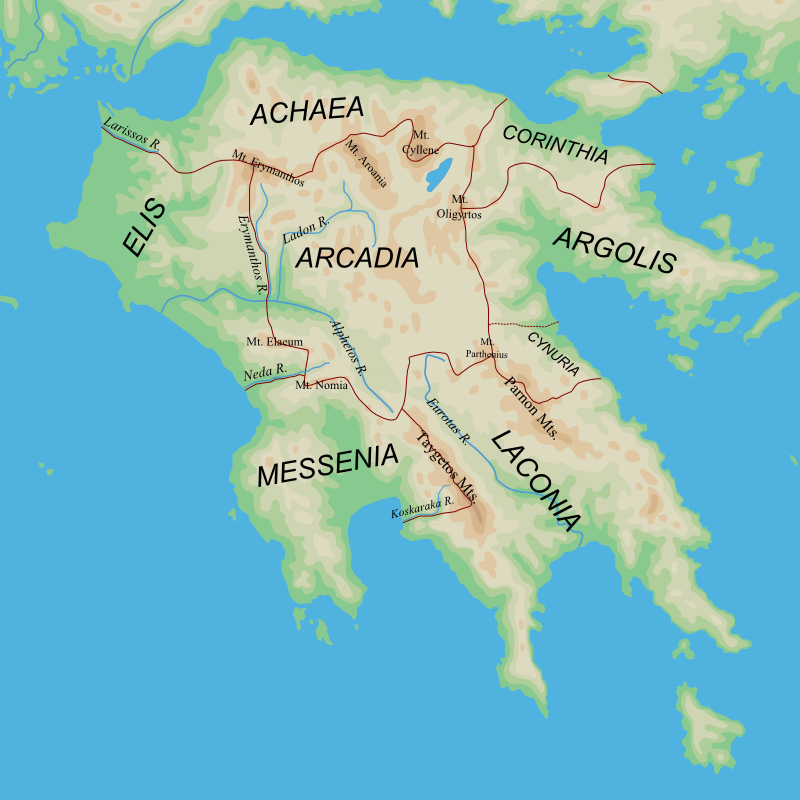I’ve hinted at this topic a couple times already in the leadup to this show, so now that we are up and running I think it is probably time to address the elephant in the room: the Curse of the Atreides. This curse, the REAL, if hidden, reason that Iphigenia is doomed, is one of two significant bloodline curses in Greek mythology and particularly in Greek tragedy. Maybe someday in another eight years I’ll win another pitch meeting and we will stage Seven Against Thebes or Oedipus Tyrannos and I’ll tell you all about the Curse of Labdacus, remarkably an even more troubling curse than this one. But until then, I have some theories about Greek bloodlines that I am eager to share with you.
Agamemnon comes by the blood on his hands honestly. He is following in a rich familial tradition of kinslaughter dating back to his great-grandfather Tantalus, a king on the West coast of what is now Turkey. Tantalus, for reasons passing understanding, took it into his head to test the gods’ infallibility. When the Olympians attended a banquet hosted by Tantalus, he butchered his own son Pelops, cooked him, and fed him to the gods to see if they would notice. What he would get out of this, other than a dead son and, I suppose, the satisfaction of being right, is unclear. In any case, he was wrong. The gods DID notice that the kid they were eating was human and not goat as they were promised (with the exception of Demeter, who was still in mourning for her daughter Persephone and inadvertently ate some of Pelops’ shoulder) The gods were understandably aggrieved at Tantalus, both for attempting to force them into anthropophagy and for thinking he could trick them. He was sent to Tartarus, where he stands in a pool of water up to his neck with a bunch of grapes above his head. If he bends his neck down to take a drink the water recedes, and if he cranes his neck up to eat a grape the branch lifts out of his reach. His eternal torment is where the word “tantalizing” comes from.

Pelops, in the meantime, was restored by the gods and fostered for a time on Mount Olympus, where Hephaestus even built him a new shoulder out of ivory to replace the portion that Demeter ate. He sought the hand of Hippodamia in marriage, but her father King Oenomaus of Elis, fearful of a prophecy that he would be killed by his son-in-law, challenged him to a chariot race for consent to wed her, with his life as the hazard. Oenomaus had been running this con for a while, having claimed nearly 20 past suitors’ heads after defeating them in chariot races. But the other suitors weren’t the favorites of Poseidon, god of the sea and of horses. Nor were they trapped in a polluted bloodline whose every generation would pass more atrocities on to their offspring, turning them more vile and depraved and pathetic with each passing year. Pelops was both. He conspired with Oenomaus’ chariot driver Myrtilus, offering him half of the kingdom and the first night in bed with Hippodamia, if he would betray his master. Myrtilus leapt at the opportunity and sabotaged the chariot before the race, killing Oenomaus (and fulfilling his prophecy). When he approached Pelops to demand his cut, Pelops accused him of trying to rape Hippodamia and threw him off a cliff. His, shall we say, eventful life gave us the name for the Peloponnesian Peninsula, the large southern landmass of Greece separated from the rest of Europe by the Isthmus of Corinth.

Pelops’ sons Atreus and Thyestes are where it starts to get really complicated. First of all, the two of them conspired to kill their half-brother and Pelops’ favored son Chrysippus [for reasons I don’t want to get into now but I swear I can talk about if we ever do that Oedipus stuff and the Curse of Labdacus like I threatened earlier -KH] and they were exiled. While in exile they were jointly named as the stewards of Mycenae (or Argos, depending on who you ask) while its king Eurystheus warred with the sons of Heracles; when he was killed in battle Atreus and Thyestes ascended to the throne. But two men may not sit on one throne, and soon Atreus and Thyestes were at one another’s throats. Atreus found a golden lamb in his flock while looking for a sacrifice for Artemis, and gave it to his wife Aerope to hide it from the goddess [insulting Artemis is a family failing, it would seem -KH]. Aerope promptly turned it over to her lover Thyestes, who proposed to Atreus that the crown of Mycenae should go to whoever had a golden lamb. His brother somehow didn’t sense the obvious trick here and agreed, at which point Thyestes produced the lamb and won their contest. Atreus got him back by wagering that the crown should go to whoever could make the sun rise in the West and set in the East, after Zeus told him that Helios had been offended by Thyestes’ duplicity and would drive the chariot of the sun across the sky backwards to help him win back the throne.
After this their prank war took a turn. Atreus found out about the affair between his wife and Thyestes, and to get revenge he took a page from his grandfather’s cookbook, killing his nephews Aglaus, Orchomenus, and Calaeus and cooking them into a pie, Titus Andronicus-style, that he fed to their father. Thyestes’ inadvertent cannibalism left him polluted, unfit for human company, and he was exiled. While in exile an oracle informed him that, if he had a son by his daughter, that son/grandson would kill Atreus. Seeming to believe that if he was polluted anyway there was no harm in incurring more, he did so, raping his daughter Pelopia and fathering Aegisthus. When Aegisthus came of age he, true to prophecy, seized the throne, killed his uncle Atreus, and banished Atreus’ two sons, Agamemnon and Menelaus, who found refuge in the court of King Tyndareus of Sparta.

While in Sparta Agamemnon and Menelaus married Tyndareus’ daughters, the clever Clytemnestra and the beautiful Helen, and with the support of the Spartans Agamemnon took his throne back from Aegisthus. When Tyndareus abdicated Menelaus became king of Sparta, and the scene was set for the beginning of the Trojan War, which I do not have time to explain here. While awaiting the muster of Greece to sail for Troy, Agamemnon continued the cycle of violence by killing his daughter Iphigenia as a sacrifice to Artemis as repayment for his boast of being a better hunter. Clytemnestra took her revenge during his long absence fighting the Trojan War by taking his father’s killer, the exiled Aegisthus, as her lover. When Agamemnon returned to Mycenae with his captive seer Cassandra in tow, Clytemnestra and Aegisthus caught them both in a net while they bathed and killed them, and Aegisthus, like Grover Cleveland, took power once again. Agamemnon’s son Orestes, having been away in Athens, returned some years later in secret on orders from Apollo and met his long-lost sister Electra. The two of them killed Clytemnestra and Aegisthus, as well as their son and Electra and Orestes’ half-brother/uncle/cousin Aletes. For the crime of matricide Orestes was tormented by the Furies and fled back to Athens, where Athena and Apollo interceded and the citizens gave him a trial. They found in his favor and the curse of House Atreus is finally broken.
What I find particularly interesting in the Atreides bloodline curse is the cannibalism. The kinslaughter is bad, certainly, but it is relatively common in these sorts of stories. But cannibalism is an entirely different kettle of…fish. Very uncommon in Greek mythology otherwise, it makes a surprising TWO appearances in the five generations of this curse. Even more interesting is that, in both cases, the victims of the cannibalism are the offspring of the perpetrator. I am aware of only a handful of other examples of fathers eating their sons in the canon of Greek myth: Tereus tricked into eating his son Itys by his wife Procne after he raped her sister Philomela and pulled her tongue out and the whole sorry trio being turned into birds by Apollo out of pity, Lycaon eating his son Nyctimus at another banquet for the gods and being turned into a wolf by Zeus out of disgust, giving us the name Lycanthrope for werewolves and apocryphally originating a werewolf cult on Mount Lykaion, and Kronos King of the Titans eating each of his children as they were born, out of fear of the one who would eventually usurp him. Cannibalism, as I have addressed before, is heavily associated with abandoning your humanity and identifying with another class of being, so I am not surprised to see animal transformations featured in these other stories. But why does it not feature in the Atreides myth?

I believe the answer lies on Mount Lykaion and Mount Olympus. King Pelasgus, the father of Lycaon, was the namer and progenitor of the Pelasgians, the legendary inhabitants of prehistoric Greece from whom the “modern” Athenians and Thebans and Telamonians and Argives, etc. of Agamemnon’s time were descended. Agamemnon’s own ancestor Pelops, a victim of cannibalism, was similarly revered as the father of the Peloponnese, the people of the Peloponnesian Peninsula, in the times of Homer and Euripides. Kronos ate all of his children but for Zeus, who overthrew Kronos and became King of the Gods. And Zeus himself was always on guard for the next hero to usurp and replace HIM; Achilles, notably, was sometimes considered a threat to the throne of the Great Thunderer. It is my contention that cannibalism, particularly when you keep it in the family, was strongly associated in Ancient Greece with founding new tribes and dynasties. I think that Orestes had the opportunity to be either the progenitor of a new tribe, perhaps unifying all of Greece as his father did, but permanently, or the king of a new generation of gods, overthrowing the capricious Olympians and ushering in a wave of justice and rationality, as befits the first man ever acquitted by a jury. What happened in my little pet theory to turn him off the Golden Path is unclear, but from where I’m sitting he had as good a shot at the throne as anybody.

Timothee Chalamet as Duke Paul “Muad’Dib” Atreides, in Denis Villeneuve’s 2021 DUNE, produced by Legendary Entertainment.
Iphigenia is, unfortunately, little more than a footnote in this broader view of her family tree. For the Ancient Greeks her main job was to die, first to loose the winds for Troy and second to seal Agamemnon’s doom as a filicide. That may have been fine for them, but here at We Happy Few we like our female characters with a little more to do. Come see what agency we found for her! Tickets are still available here!